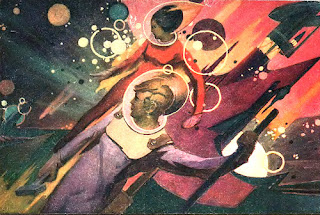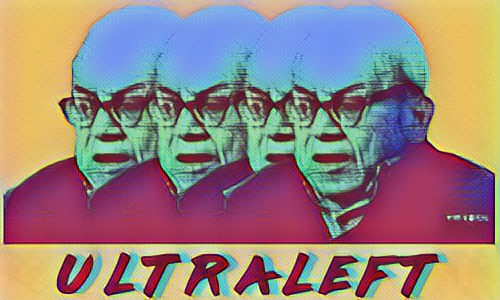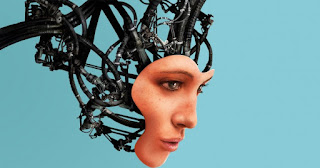Science Fiction: Utopias and Theology
Science fiction offers the intersection of utopian politics as well as theological questions. The continued development of technology poses serious complications for utopian society and religious conviction. Thankfully science fiction is the perfect place to deal with these questions. Just as philosophers dream up thought experiments to test certain principles we explore the mysteries posed by science fiction politics and theology.
Interestingly, the examples of utopian literature are themselves forms of science fiction. Even from one of the first utopian stories, The Republic by Plato was the first work of world literature to envisage an ideal state, and to lay down concrete parameters as to the activities of each and every class within society. Then Utopia by Thomas More (1516) of course! Eponymous founder of the genre; brilliant mixture of satire, political idealism, and obfuscation of the author's own views. More's book has been seen by some as an attempt to justify colonisation of the Americas, by others as a dreary state of Catholic dogma and by his champions as a proto-communistic vision. The book's very indeterminacy is testament to its constant inventiveness.
Next is The City of the Sun by Thomas Campanella (1623). In the same idealistic strain as More's book, sharing the vision of religious harmony and of genuine communitarianism. Like More, Campanella placed his ideal state in a distant land - near Ceylon - and like Plato, he envisaged a society run by a beneficent elite. A book that is resonant of the high watermark of the humanist utopian ideal. Then there is New Atlantis by Francis Bacon (1627) Although published only 25 years after The City of the Sun, Bacon's book belongs to the early enlightenment period. Bacon pictures a world in which scientific experiment could be the core of the progress of an enlightened state. As such, the book is testament to the changing conceptual framework of the early 17th-century, though, like Campanella and More, Bacon set his ideal state in a remote location, this time the South Pacific.
Erewhon by Samuel Butler (1872)
One of the most brilliant utopian novels, using a mixture of devastating satire and compelling narrative to both decry the developments of mechanised labour and to show how society might be better run. Terrified by the prospect of machines ruling the future, Butler was essentially suspicious of any model of perfection, mocking people who "really do know what they say they know.”
Looking Backward by Edward Bellamy (1888)
It is the year 2000, and while he was in a deep, hypnosis-induced sleep for 113 years the hero figure named Julian West wakes up to find the United States has been transformed into a socialist utopia. The major themes include problems associated with capitalism, a proposed socialist solution of a nationalization of all industry, and the use of an "industrial army" to organize production and distribution.
News from Nowhere by William Morris (1890)
The most visionary of the many socialist utopias conceived at the end of the 19th-century. Beautifully written, it imagines someone from this period waking up in the future and finding an earthly, pastoral, socialist paradise.
A Modern Utopia by H.G. Wells (1905)
Because of the complexity and sophistication of its narrative structure, A Modern Utopia has been called "not so much a modern as a postmodern utopia." The novel is best known for its notion that a voluntary order of nobility known as the Samurai could effectively rule a "kinetic and not static" world state so as to solve "the problem of combining progress with political stability.”
Herland by Charlotte Perkins Gilman (1915)
A utopian novel, written by feminist Charlotte Perkins Gilman. The book describes an isolated society composed entirely of women, who reproduce via asexual reproduction. The result is an ideal social order: free of war, conflict, and domination.
Walden Two by B.F. Skinner (1948)
A utopian novel written by behavioral psychologist B. F. Skinner, first published in 1948. In its time, it could have been considered science fiction. Walden Two is controversial because its characters speak of a rejection of free will. Walden Two embraces the proposition that the behavior of organisms, including humans, is determined by environmental variables, and that systematically altering environmental variables can generate a sociocultural system that very closely approximates utopia.
Island by Aldous Huxley (1962)
Huxley's last novel within the utopian genre, and one of the three or four most successful of that genre. It puts forward genuine proposals for better ways of living - including more agricultural work, mutual adoption clubs for children, societies which are largely vegetarian - while retaining realism as to the likelihood of their acceptance.
The Dispossessed by Ursula Le Guin (1974)
Brilliant utopian satire and exploration in which a capitalist planet - Urras - and its ecotopian satellite - Anarres - are described by Le Guin with pathos and realism. Urras is corrupted by its "propertarianism", but things are not perfect on Anarres by any means - individual creativity is stifled, and nothing changes.
Ecotopia by Ernest Callenbach (1975)
Imagines an ecostate, which seceded from the USA in 1980, and lives in sentimental co-existence with nature - the working week is reduced to 20 hours, bus travel is free and trees are planted on old boulevards. A blueprint for a green future.
The Female Man by Joanna Russ (1975)
A feminist utopian science fiction novel follows the lives of four women living in parallel worlds that differ in time and place. When they cross over to each other's worlds, their different views on gender roles startle each other's preexisting notions of womanhood. their encounters influence them to evaluate their lives and shape their ideas of what it means to be a woman.
Woman on the Edge of Time by Marge Piercy (1976)
The story of a middle-aged Hispanic woman who has visions of two alternative futures, one utopian and the other dystopian. It is considered a classic of utopian "speculative" science fiction as well as a feminist classic.
The Culture series by Iain M. Banks (1987-2012)
A series of novels set in and around The Culture, a multi-planet, Utopian anarchistic society. The stories center on the Culture, a utopian, post-scarcity space society of humanoids, aliens, and advanced artificial intelligences living in socialist habitats spread across the Milky Way galaxy. The main theme of the novels is the dilemmas that an idealistic hyperpower faces in dealing with civilizations that do not share its ideals.
The utopian genre is quite literally a science fiction genre. Although science fiction may be more often decorated as dystopias, the utopian strain remains strong. In addition to utopian politics, science fiction positions many theological questions.
First both religion and science fiction have a more ambiguous relationship to magic and myth than either tends to acknowledge. Is the suspension of disbelief involved in reading stories in this genre different from what is involved in reading the Bible or the Ramayana or another sacred text?
One will find that theological themes are woven into their very core-provided one understands theology not as a narrow secretarian enterprise but as asking questions and exploring mysteries related to the nature of existence, of transcendence, and of meaning.
Gods as Aliens
What can be said about the theology of stories which turn gods into aliens and aliens into gods? Some have viewed them as the falsehood of human mythology, demoting powerful spiritual entities to the level of mere biological organisms, which however powerful they might be, can be fought, and whose demands for worship may appropriately be resisted.
And if merely having been involved in bringing our species into existence does not make a being worthy of worship in science fiction, then presumably one ought not t claim that it does in ones theology about the real world.
The real issue separating the modern science fiction tales from the ancient ones is a theological question: whether the beings from above ought to be called “gods.” Yet if (as per Clarke’s law) “any sufficiently advanced technology is indistinguishable from magic,” then might it not also be said that any sufficiently advanced civilization is indistinguishable from divinity?
Science fiction, far from sounding a death knell to the gods, has populated the heavens with them. Why is science fiction considered to be antagonistic to religion, rather than being viewed as having breathed new life into certain forms of it, making the existence of the gods more plausible? It is not clear why being the result of a process of evolution should make gods less divine, any more than it makes humans less human. It is a useful thought experiment for religious people to ask how they would view the events depicted in their scriptures, if those events turned out to be actual historical events brought about by aliens.
Machines as Gods
Gnosticism
The Divine Cosmos
Creation
Alien Salvation
Time Travel
Apocalyptic and the End of the World
Loving the Alien




Comments
Post a Comment